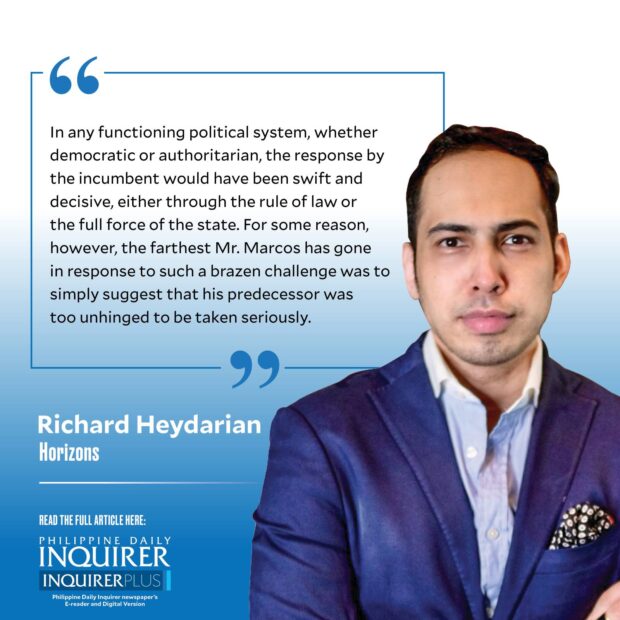
When you strike at the king, you must kill him,” the great American essayist Ralph Waldo Emerson counseled. Far from a mindless endorsement of violence, what Emerson emphasized were the stark choices facing anyone who sought to overturn a political order altogether. There are no halfways. No room for wavering. No perfect means, nor room for compromise. Once you directly challenge a monarch, you can’t second-guess yourself.
After all, history is replete with examples of failed coups, half-successful regicides, and premature revolutions, which triggered an unfathomable torrent of vengeance by a besieged monarch. Think of the fate of the former Wagner chief Yevgeny Prigozhin, who foolishly dared to march his army of disgruntled soldiers all the way to the gates of Moscow—shockingly facing minimal resistance along the way—just to raise the white flag at the eleventh hour. As practically everyone expected, the former chef-turned-mercenary general didn’t last long after his supposed “truce” with Russian President Vladimir Putin to avoid a civil war in the capital last year.
Over the past two months alone, there have been multiple, public, and direct challenges to President Marcos by no less than his predecessor. In a whole series of public speeches, Rodrigo Duterte not only tagged his successor as a “drug addict,” but even threatened popular revolt and secession of his home island of Mindanao. Not to mention the call by his son, Sebastian “Baste” Duterte—who is clearly being groomed as an alternative successor—for the current president to resign.
If anything, the ex-president has called on the country’s armed forces to reconsider their loyalty to the President. Lest we forget, Mr. Marcos was forced to undertake a major reshuffle of top defense and security officials to nip any budding civil-military relations crisis. Amid rumors of agitations by ex-generals, no less than Armed Forces of the Philippines chief Gen. Romeo Brawner Jr. publicly warned, “Some of them [are] former officers of the AFP, and I’ve spoken with some of them … Once we find out that any of our active personnel are involved in this, we will act swiftly.”
Well-informed insiders have told me that there are persistent threats of coups by elements loyal to the ex-president. In any functioning political system, whether democratic or authoritarian, the response by the incumbent would have been swift and decisive, either through the rule of law or the full force of the state.
For some reason, however, the farthest Mr. Marcos has gone in response to such a brazen challenge was to simply suggest that his predecessor was too unhinged to be taken seriously. And this raises a major question: Is Mr. Marcos too soft and faint-hearted in the face of direct and repeated challenge by one of the most powerful dynasties in the country? Or is he just being strategic by biding his time, especially with the 2025 midterm elections approaching?
It goes without saying that behind the scenes there are ongoing moves and countermoves. To begin with, there are allegedly ongoing “purges” of Duterte-era appointees in key government agencies. Moreover, key international allies seem to be willing to lend assistance in tracking and tracing potential “sharp power” operations by China, which is clearly banking on its proxies in the Philippines.
Nevertheless, Mr. Marcos, the commander in chief, has three major cards to play. Tactically, the ruling establishment has the option of forcing the Dutertes into a rearguard action by supporting their rivals in the Deep South, especially ahead of next year’s elections. At some point, either the former president or the current Vice President may be forced to reassume mayorship of Davao City in order to head off any robust challenge by their erstwhile rivals at home.
Moreover, they can also start supporting viable contenders for the 2028 elections, most notably Sen. Rafael “Raffy” Tulfo, who is reportedly already leading in several unpublished yet authoritative surveys of future “presidentiables.”
But Mr. Marcos’ ultimate card is the International Criminal Court’s (ICC) impending warrants of arrest for Duterte-era officials allegedly involved in crimes against humanity. The ICC issue, however, is fundamentally about justice and the rule of law. William Shakespeare once said, “Some are born great, some achieve greatness, and some have greatness thrust upon them.” It’s time for the incumbent to finally achieve something great on his own terms.
rheydarian@inquirer.com.ph